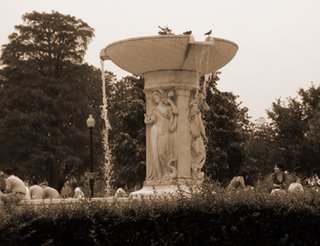 What makes me feel that I have the right to live this life I live, and then to write about it?
What makes me feel that I have the right to live this life I live, and then to write about it?I am where I want to be, where I have always wanted to be. I might have longed for temporary sojourns in one or another of the great capitals of the world, but Washington, DC is the place I've always wanted to call home.
When I think of writing about this, the models of literature serve me. The images of city life in the books I love are created by people whom I can think of as being much like me, and they describe my life. They are created by people who breathe air. The light they see the world through is the same light that illuminates me and my surroundings. They suffer through cold and wet, and yearn for sun and warmth. Their food is agreeable. The city teaches them of loneliness and alienation or the misfortunes of their neighbors. The city also provides a home.
From 1988 to late 1991 I worked at a large Washington law firm whose offices in downtown were a stone's throw from Dupont Circle. In warm weather I used to buy lunch at one of the many take-out restaurants in the neighborhood and head to Dupont Circle to settle on one of the inner row of benches. The fountain in the center of Dupont Circle resembles a flying saucer, held aloft by two Greek women in flowing robes and one scantily clad Greek man blowing on a conch shell. Water pours from the saucer in a silky curtain into the basin below.
My theory that Dupont Circle is a paradise in the heart of the city and the nation goes this way: In Dupont Circle poor meets rich, old meets young, gay meets straight, native meets new arrival, and the peoples, styles, and languages all squish together to form America. Love begins here during morning rush hour with a glance. At midday, political and religious evangelists stop passersby with a few words, a petition, a holy book. In the afternoon, solo figures pursue venture capital and real estate deals using tiny phones. In the evening, dogs approach or snub one another. People find good food nearby, designer and regular ice cream, coffee simple or embellished, newsstands, movie theaters with smallish screens.
But what conclusively distinguishes Dupont Circle from its Parisian ancestors and Washington cousins are the dozen bookstores within a few minutes' walk. Bookstores enough to gladden any newly published author's heart. Bookstores chain and independent, specialty and general; large stores inventoried via satellite and corporate projection, small stores inventoried according to individual whim. Bookstores filled with thrillers and self-help books that sell like hotcakes, and bookstores obstinately maintaining law, philosophy, literature, and social history collections. Stores where books are as surprised to find themselves rubbing up against each other as the people who crisscross great Dupont Circle itself, queer theory thrust into briefcase alongside military biography, genetics text squeezed into the same well-worn backpack with epistolary love story.
Dupont Circle, despite commercialization, gentrification, and Metro-station domination, is still perfect.

No comments:
Post a Comment